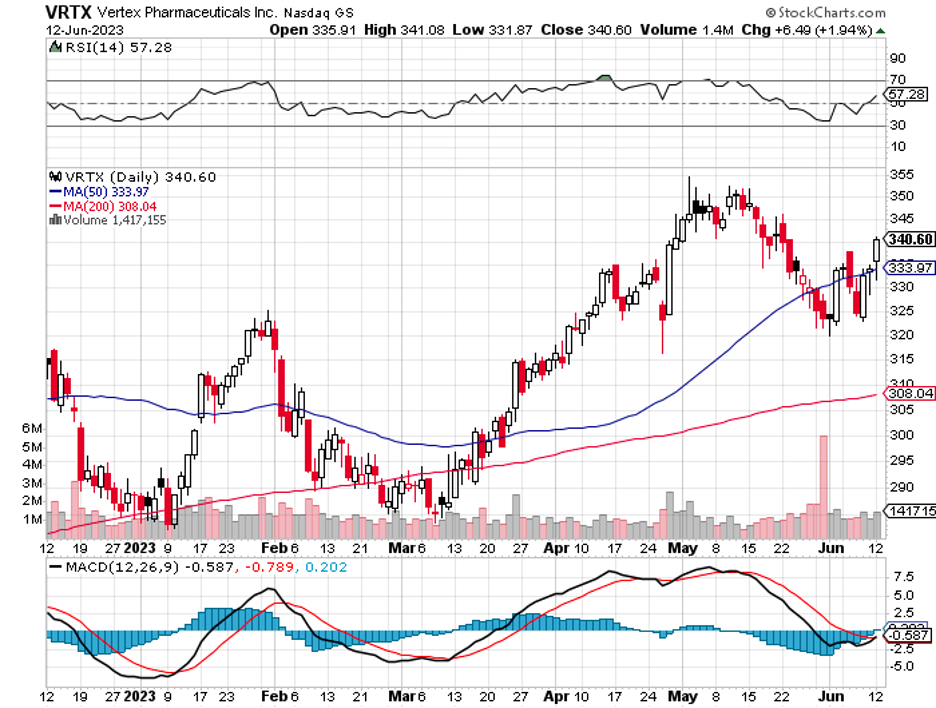Bucking the Trend
The notion of "Sell in May and go away" hasn't exactly proven true this year in 2023. Surprisingly, the stock market has been experiencing an impressive upward trend, especially in June, and there may still be further potential for growth.
Allow me to share one of my favorite examples that embody both profitability and consistent expansion, all while enjoying a significant competitive edge.
In the biotechnology and healthcare sector, Vertex Pharmaceuticals (VRTX 1.94%) fits the description perfectly.
This company stands out as the undisputed leader in the market for cystic fibrosis treatments, offering a unique portfolio of drugs that specifically target the underlying cause of this genetic condition.
These groundbreaking medications, known as CFTR modulators, have successfully been introduced to the market, with Vertex Pharmaceuticals spearheading the way by bringing forth four of them.
Vertex has been continuously making remarkable progress in the field of cystic fibrosis (CF) treatment.
A notable achievement is the expanded approval of their drug, Kalydeco, by the U.S. Food and Drug Administration. It can now be used to treat CF patients as young as one-month-old, marking a groundbreaking milestone as the first CFTR modulator ever approved for this age group.
Kalydeco has also been a significant revenue generator for Vertex, ranking as their second highest-earning drug with an impressive $553 million generated over 12 months.
But there's more to Vertex's success.
Their flagship medication, Trikafta, takes the lead as their best-selling drug, raking in a staggering $7.7 billion in revenue in 2022 alone.
Recently, Trikafta received approval to treat children as young as two years old with specific mutations, providing relief to nearly 1,000 more individuals in the cystic fibrosis patient community.
The long-lasting patent protection of Trikafta, with approximately 14 years remaining before expiration, holds great significance for Vertex Pharmaceuticals. With a relatively modest patient population of 88,000, the company has ample opportunities for further growth.
The robust revenue and profits of Vertex's CF franchise speak to their success in this area. Additionally, AbbVie's (ABBV) decision to discontinue its CF program further solidifies Vertex's monopoly in the cystic fibrosis field, strengthening its position for continued success.
While capitalizing on the expanding market for cystic fibrosis treatments, Vertex Pharmaceuticals also targets underserved areas to drive long-term growth.
One promising drug candidate in their pipeline is VX-548, a non-opioid medication designed to address acute pain conditions, which is nearing commercialization.
Moreover, Vertex has a highly promising candidate in its pipeline that goes beyond cystic fibrosis.
Collaborating with CRISPR Therapeutics (CRSP), the company eagerly awaits regulatory approvals for exa-cel, an innovative treatment for sickle cell disease and transfusion-dependent beta-thalassemia, in both the United States and Europe.
Exa-cel represents just the tip of the iceberg when it comes to Vertex's upcoming arsenal of new drugs.
The company holds great optimism for VX-548, a cutting-edge non-opioid therapy targeting acute pain, as well as its triple-drug combination for cystic fibrosis, which features vanzacaftor.
Both treatments are undergoing Phase III trials, with expectations for completion in late 2023 or early 2024.
Additionally, Vertex is conducting a pivotal trial for inaxaplin, a potential treatment for APOL1-mediated kidney disease that impacts a larger patient population than cystic fibrosis.
Needless to say, Vertex has been experiencing an exceptional streak, consistently outperforming the market over the past year. The best part is that its potential to generate significant returns extends well into the next decade.
While Vertex possesses a variety of potential approvals for treating cystic fibrosis, some of which may materialize before 2028, its CF-related revenue is expected to grow substantially even without factoring in those additional approvals.
Analysts anticipate a solid annual increase of 8.2% in the company's overall revenue over the next five years. Although this growth rate is commendable for a biotech industry heavyweight, it falls short of Vertex's impressive 38% annual growth achieved in the previous five years.
From my perspective, the projected 8.2% growth appears rather conservative.
This sentiment is particularly amplified when considering the imminent potential approval of exa-cel, an innovative gene-editing therapy targeting sickle cell disease (SCD) and beta-thalassemia (TDT).
After all, the initial market value of exa-cel could soar to a staggering $64 billion, and given the life-altering impact it offers, a price tag of approximately $2 million per treatment is justifiable.
Honestly, I'm hard-pressed to find anything negative to say about Vertex. This prominent biotech company is constantly delivering positive news and making significant strides on all fronts. I recommend you buy the dip.



